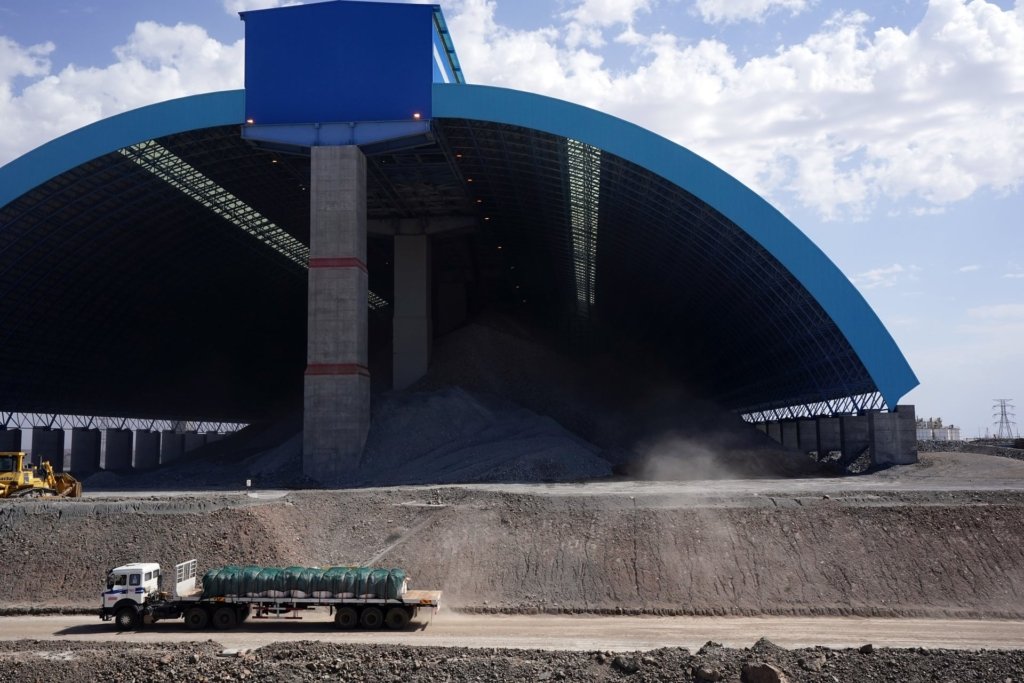Displaced from their land by multinational mining companies, nomadic herders defied the odds to preserve their heritage for future generations
by Rod Austin
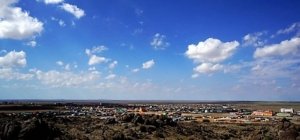
Just 10 years ago, the district of Khanbogd, in southern Mongolia’s Omnogovi province, was a barely known region of eastern Asia.
That changed with the discovery of gold and copper deposits below the seemingly endless Gobi desert, home to a community of herdsmen who had worked hard to make a living from this barren land. So when their government forged an agreement that threatened to deprive them of the land they had owned for generations, they fought back for their way of life, taking the mining giant Rio Tinto and others to court in order to safeguard their heritage.
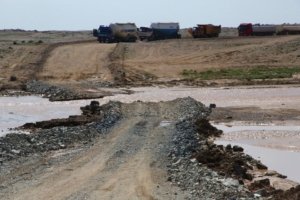
“We hope the fight of the eight of us can serve as an example all over Mongolia, and for others who have the same problem with mining,” said Battsengel Lkhamdoorov, leader of Gobi Soil, the collective that took the mine owners to court.
The four-year fight resulted in a landmark victory, a tripartite settlement that allows for an equal, mutually sustainable coexistence between mine owners, the town of Khanbogd and herders.
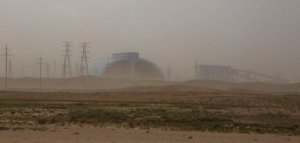
Mongolia, one of the least densely populated countries on Earth, has only 1.9 people per sq km. Once ruled by warlord Genghis Khan, its population consists mainly of herders living in traditional “gers” – circular white, yurt-like structures, that infrequently dot the desert landscape, surrounded by sheep, goats, camels and horses.

The construction of the Oyu Tolgoi – meaning Turquoise Hill – gold and copper mine (pictured below) was led by Rio Tinto Group, Ivanhoe Mines and the Mongolian government. Construction began in 2011, displacing the herdsmen, who claim they were reduced to collecting waste from the mine just to make a living. They soon decided they had to fight back.
“Before the mine, we were living a traditional independent life, relying on ourselves. They made us go to other pastures, we felt like outsiders. From being a proud herder on my own pasture to rubbish collection for a foreign company … I felt so angry and frustrated,” says Lkhamdoorov (left), who, with eight others, led the struggle for herders’ rights.
Their traditional way of life soon gave way to construction, lorries and dust. As industry encroached, mining structures, dressed in a distinctive blue, were erected on the landscape and Khanbogd’s population exploded by 350%, from 2,000 people to 7,000.
“It is our land, our pasture and everything under our land is ours. It is the wealth of the Mongolian people,” says Lkhamdoorov.
According to the herders, contractors accessing underground water for the mine diverted the Undai river, reducing the supply available for livestock. They could only stand by and watch, powerless, as their pastures deteriorated and wells dried out, claiming the lives of their animals. Khanbogd continues to suffer from a shortage of water as mining drains the valuable resource.
“Now there is no water, as it has been diverted for the use of Oyu Tolgoi,” says Lkhamdoorov. “They built their own well to take water from underground to use for themselves and changed the direction of the Undai River, so the herders’ wells dried out. In terms of nature and ecology, two fundamentals are needed for successful herding: pasture and water.
“Without them, our cattle and camels died. I decided to leave herding, the only livelihood I knew. [But] we didn’t know how to support ourselves any other way.”
Nowadays, power lines and pylons replace cattle. A constant flow of heavy lorries now forms the backdrop to the gers, the vehicles’ wheels churning the brown sand, creating dust clouds that can be seen for miles.

Oyu Tolgoi is one of the largest known copper and gold deposits in the world. Exploration continues and a Rio Tinto spokesman told the Guardian it is expected to operate for more than 50 years. It is also Mongolia’s biggest employers with more than 17,000 employees and contractors, of which approximately 93% are Mongolian.
Sitting in his home as he prepares to eat a traditional meal, Lkhamdoorov, 45 (pictured below with his mother, Tseesuren), reflects on his childhood. “The only thing we knew was how to herd livestock. We helped our parents, we played with stones, imagining this was our ger, this was our bed, this was our sheep, our camels. We would collect stones in our shirts and play livestock with them.
“I felt bad for my children and their future. Would they also have to live like us? Collecting rubbish for someone else? My parents didn’t bring us up to collect rubbish for others.”
For Lkhamdoorov’s mother, Tseesuren, mining in Khanbogd has changed life irrevocably. “I was born in a ger and I’ve been a herder all my life. I thought I would live my entire life on my own pasture herding my livestock,” she proudly says.
In 2004, however, Tseesuren says she was forced into involuntary resettlement. “People were coming, saying no one could live within 10km [of the mine] and we would be forcibly resettled if we didn’t move,” she recalls. “If we went voluntarily, they would give us a timber house – but if we didn’t, we’d get nothing. I didn’t understand, and the family was put on the list to be moved.”
In 2005, Lkhamdoorov quit herding to become an activist after his land made way for the mine. “That was a very difficult decision, but the livestock were not gaining weight, there was not enough water or pasture, so my wife and I decided to work at the mine. For four years, I worked a forklift. But I was fired for drinking [fermented milk] during Nadaam.”
Six years later, Lkhamdoorov was re-employed at the mine. Along with fellow herders, he was tasked with collecting waste and rubbish from the site. “We felt why should we, as proud herders, be compensated by collecting rubbish? It’s our land, our wealth” – so in 2012 they set up Gobi Soil to fight for their rights.
Goats near the gold mines on Khanboqd pastures, Gobi desert, Mongolia.“We conducted protests in front of the mines, using loudspeakers to shout: ‘Stop using groundwater, stop mining.’ We felt like heroes; we were going to do such and such, but we didn’t know anything at all … We had no idea we could achieve what we have today.”
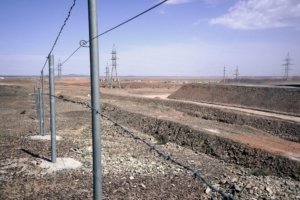 For Lkhamdoorov’s mother, Tseesuren, mining in Khanbogd has changed life irrevocably. “I was born in a ger and I’ve been a herder all my life. I thought I would live my entire life on my own pasture herding my livestock,” she proudly says.
For Lkhamdoorov’s mother, Tseesuren, mining in Khanbogd has changed life irrevocably. “I was born in a ger and I’ve been a herder all my life. I thought I would live my entire life on my own pasture herding my livestock,” she proudly says.
In 2004, however, Tseesuren says she was forced into involuntary resettlement. “People were coming, saying no one could live within 10km [of the mine] and we would be forcibly resettled if we didn’t move,” she recalls. “If we went voluntarily, they would give us a timber house – but if we didn’t, we’d get nothing. I didn’t understand, and the family was put on the list to be moved.”
Presented with an agreement to sign that she says she did not understand, Tseesuren believed she was obliged to move if told to. When local administrators promised a timber fence for the animals, she signed; the family was resettled along with 10 others.
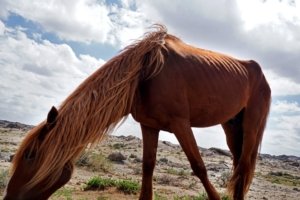
“When I signed the resettlement agreement, I never thought it would be such drastic changes,” says Tseesuren. “We lost our pastures, dust from heavy vehicles affected our animals’ lungs so badly. I never knew it could be like this when I signed. Never even imagined it.
“It was difficult, I was so sad, seeing my animals not having enough to feed on. They became thin and undernourished, not having enough to thrive on. It was hard for me to go to another place … When we did move, there were other people around, we had to share pastures – but then the pastures became exhausted due to too many animals.
“I don’t see anything of benefit.”
Although proud of her son’s achievements, Tseesuren has concerns. “He has been fighting for five years, the tripartite agreement has been signed; I am so proud, and thank my son. Herders will be able to get some compensation, but what worries me is that the implementation is taking so long. I still hope for action.”
Of the future, Tseesuren says: “I don’t know how long I will live, maybe until I’m 90. I am worried that my children and grandchildren will not have any water, our underground river dried up; we are having desertification, not just here but on Mother Earth … How will they live without water?”
Contemplating the political landscape is Nergui (left), 68, who was a local politician in Khanbogd prior to the mine’s construction. Born into a family of herders, she used her political knowhow to help fend off the mining companies and government.
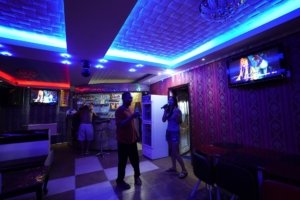
“My dad was a herder and the disciple of a Buddhist monk. During the communist years, he was persecuted and spent years in prison. I began herding during the time of collectives; I embraced it and excelled. When I was 22, I was awarded national young champion herder.”
In the early 80s, the Khanbogd Soum (local authority) elected Nergui to represent them in the national parliament. She did the job, which would last five years.
“I felt very proud and honoured to be elected. I met with constituents who were all herders, recording what they said or asked, and I took those comments to parliament. There were no complaints as the admin of the soum took care of everything from water to pastures… Maybe they would ask for equipment and tech help, minor issues, not like now.”
Nergui says: “At that time, pastures were good, there were wells, with well-maintained manual pumps … it was easy. There were never any problems with other herders as people were not drinking alcohol like they are today. There was no crime either like there is today, only petty offences.”
The impact of resettlement weighs heavily on Nergui’s mind. Already concerned about the lack of water, she also fears that the integration of herders into other areas controlled by land owners will be rejected. Rivalry, she warns, could be a major issue among her people.
“If they move [us] to another pasture in Khanbogd, we won’t be greeted nicely. People will be hostile, saying we have given our land to foreigners and will ask: ‘Why are you coming here?’ They are already reluctant to share pastures and wells; some are even locking wells. Our livestock will be sent away, as they accuse us of burdening them by using their resources.”
As her granddaughter plays outside, Nergui explains that even children face hostility when visiting neighbouring sums – or districts – in search of water from wells.
The areas upon which Nergui and other herders live, known as Turquoise Hill, are sacred sites. Many fear that mining has offended the spirits who oversee their wellbeing and prosperity.
Nergui believes she is being personally punished: her daughter has epilepsy. “I went to a shaman to see what the problem was and was told that my daughter was sick because Mother Earth has been offended and the land cursed of water.
“Some things cannot be healed.”
Erdene Bayar has had to give up herding. A strong believer in tradition, Bayar claims he struggles with a loss of identity.
“I was born into a family of herders,” he says. “My grandfather was Baldan Gombo, which means prince taij [prince of splendour]; he was a silversmith and very artful. I never met him, as at the age of 30 he was sentenced to death for being an aristocrat.
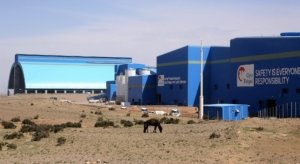 “I care about my land, my surroundings, and believe in the knot of nationalistic feeling and traditional life, as well as the things I use every day that I inherited from my parents and grandparents. I feel that being a traditional herder and continuing our traditions ties into a knot of harmony.” Prior to the construction of the mine, Erdene enjoyed being a herder, providing for his family by rearing 300 sheep and goats.
“I care about my land, my surroundings, and believe in the knot of nationalistic feeling and traditional life, as well as the things I use every day that I inherited from my parents and grandparents. I feel that being a traditional herder and continuing our traditions ties into a knot of harmony.” Prior to the construction of the mine, Erdene enjoyed being a herder, providing for his family by rearing 300 sheep and goats.
Another member of the community born long before Oyu Tolgoi came to town is Ulziibayar. Drawing heavily on his cigarette, he reflects his knowledge of the area.
“My father wrote traditional yurich [poems] about the river, but now the river is no more,” he says. “It was called the river Undai because thousands of soldiers belonging to Genghis Khan drank there; 20 km from here, there is a rock where he rested.”
In 2004, Ulziibayar and his family have resettled 2km away and provided with a timber house and a well. He has since moved away, but his relatives still live there.
As water became scarce and the quality of his land declined, herding became difficult to sustain, says Ulziibayar. He now herds part-time, having had to get a job, working with a contractor who supplies tables and chairs for events held by the mine owners. “I am happy enough doing this now and I am certain that my boys will continue herding. It is very important to me that they do, even if they end up getting a [part-time] job.”
Ulziibayar is worried about the delay in implementing the agreement. He questions what can be done to move matters forward. “Of course we are angry and frustrated. But what can we do?”
Lkhamdoorov stands looking towards the mine, ground upon which his ancestors also stood – and where his own family once reared cattle. He is among many who believe that that the desecration of sacred land and mine processing methods have impaired the health of livestock, causing lung and liver disease and leaving horses emaciated and the carcasses of dead cattle littering the landscape.
A Rio Tinto spokesperson said: “The Mongolian government owns 34% of Oyu Tolgoi and Turquoise Hill Resources (THR) owns 66%. We own 50.8% of THR and became the managers of the mine in 2010.
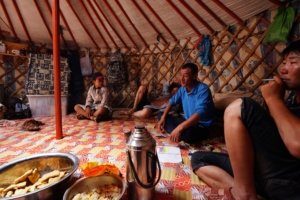
“Two types of displacements were managed during construction: a) Physical relocation – in 2003, 10 herder households were relocated. In 2004 an agreement determining the terms, implementation, management of the resettlement and compensation was signed by each household; b) economic displacement – when construction started in 2011, a further 89 households were affected economically, but did not require relocation. A compensation agreement was agreed with the affected households.
“Oyu Tolgoi did not force any herders to move, most households are still camping and have access to pastures within 10km of the mine lease area.”
With the help of international organisations such as Oyu Tolgoi Watch and the compliance adviser ombudsman, Gobi Soil achieved their goal in 2017, signing off the agreement that preserves the rights of Khanbogd’s herders and residents. It sets out plans for more than 60 actions related to pastureland, water and compensation, including herder livelihood support, environmental management and rehabilitation projects.
However Lkhamdoorov acknowledges that progress has been slower than he would have liked.
“They promised to build a slaughterhouse, lab and market but this has not yet happened,” he says. “The intention is for the mine owners to buy meat from us to help sustain our existence. This includes measures to solve the water shortage. Compensation has yet to be paid, but they keep saying that they are restructuring. Little things have been done, but nothing important.”
The construction of a road to and from the site has improved access to the town and transport links, the most prominent being Khanbumbat airport, which was opened in 2013 and now has the second highest passenger traffic figures after Chinggis Khan airport in the capital, Ulaanbaatar.
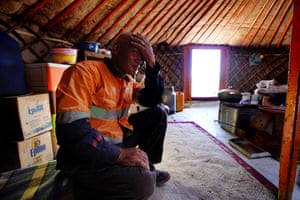
The spokesperson added: “We are well on the way to completing the agreed plans, with 80% complete. The final actions include the establishment of a herders’ market, construction of a permanent slaughterhouse, additional health services, improving the communication coverage in Khanbogd sum and a project to support and assist young herders.
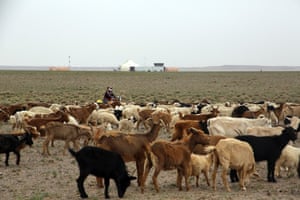
“The Tripartite Council has also reassessed the eligibility of claims submitted by herder households who feel they were unfairly left out of the 2004 and 2011 compensation programmes, 174 claims have been reviewed, 129 qualified for compensation. MNT 2.6bn (£750,000) has been paid out in compensation.”
For the herders, there seems a brighter future: “We spent so many years working on this agreement,” says Lkhamdoorov. “I hope it will work. It is the result of many years of fighting and negotiations. There are around 60 undertakings in it, and our herders should get benefits from this.”
It will take until 2024 to implement the agreement in full, but it is hoped that the monitoring agreement, and meat and dairy factories and markets, will sustain the herders until water sources are restored.
“I feel really optimistic that herders will have new opportunities that will cause economic engagement with the market, so that young herders will see the opportunities of herding – not just here, but for the region.”. This feature was first published in The Guardian, April 8, 2019

